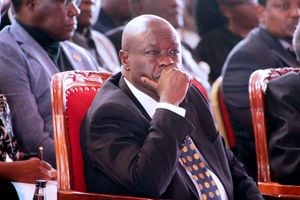Ruto@2: Sh2.3 billion saved under Boma Yangu amid protests over housing project

The Boma Yangu housing project in Nairobi. President William Ruto is today set to launch an affordable housing project in Kibra’s Soweto B, where 5,000 units will be constructed.
What you need to know:
- Kenya Kwanza had projected in its manifesto to put up at least 250,000 units every year. This projection has not been met.
- Currently, six petitions are before courts challenging various provisions of the new Affordable Housing Act, including the collection of the housing levy. The initial act was declared unconstitutional, forcing Parliament to enact a new Act.
State House has revealed that about half a million Kenyans have saved more than Sh2 billion under the Boma Yangu Initiative, even as President William Ruto’s affordable housing project continues to face rejection two years on.
State House Spokesperson Hussein Mohammed said that as of August 6 this year, 531,043 Kenyans had saved more than Sh2.255 billion under the initiative.
This is as the government appears to defend the affordable housing project that has remained controversial, with a majority of Kenyans opposed to the deduction of 1.5 per cent of their gross income to finance the ambitious project.
Kenya Kwanza had projected in its manifesto to put up at least 250,000 units every year. This projection has not been met.
Currently, six petitions are before courts challenging various provisions of the new Affordable Housing Act, including the collection of the housing levy. The initial act was declared unconstitutional, forcing Parliament to enact a new Act.
In implementing the programme, Parliament enacted a law that provides for a 1.5 per cent deduction of the gross income of salaried Kenyans, with a similar amount matched by the employer. Those in the informal sector are also deducted 1.5 per cent of their income.
However, the Kenya Kwanza administration has insisted that the programme is meant to improve the quality of life of those in the lower spectrum.
Speaking during a town hall meeting in Kisumu on August 28, the president expressed concern that the housing programme has been hindered by various challenges despite its potential to transform the lives of Kenyans.
“This is a programme that has undergone a lot of challenges, we have been taken to court so many times because there are people who cannot see the value of housing,” the Head of State said.
“The Housing programme was on the Azimio and Kenya Kwanza manifesto. I find it strange that there are people who want to oppose it for the sake of opposing it.”
The affordable housing programme is one of President William Ruto’s five pillars under the Bottom-Up Economic Transformation Agenda (BETA). The programme is designed to allow ordinary citizens to live in decent homes. It further seeks to give millions of unemployed youths jobs and business opportunities, according to the Kenyan Kwanza administration.
“We are determined to eliminate slums in our cities and towns to ensure Kenyans live in decent and dignified homes with guaranteed social amenities,” Ruto said on September 9, when he inspected the construction of the more than 4,054 units of the Kibra Soweto East Affordable Housing Project.
The government estimates that more than 60 per cent of urban Kenyans live in slums and other poor housing, which lacks basic services and critical infrastructure.
Mr Mohammed said that unlike the previous programmes, which had units priced between Sh7 million to Sh8 million, the affordable housing project has been able to offer units between Sh1 million to Sh3 million.
He said that the uptake of the units has been commendable, stating that 1,370 affordable units at Park Road, Nairobi, were sold out within 90 days. More than 33,000 Kenyans, he said, made deposits for the units, but many opted to wait for future allocations rather than request refunds.
President Ruto has repeatedly said land fragmentation in rural areas poses grave danger to the country’s goal to increase agricultural production and make the country food-sufficient.
“We want to reverse the subdivision of lands which is denying us the opportunity to increase food production,” said the president in Nyanza.
President Ruto has also repeatedly said he is banking heavily on the project to create jobs for the youths.
“There are three things I said I would do in my tenure; a robust housing programme- not because we are looking for houses only but because housing creates millions of jobs,” the President said.
“There are millions of jobless youths, and we have to be deliberate in generating opportunities for them.”
With an estimated 160,000 direct jobs so far created, while others are engaged in the construction value chain through the supply of various materials such as fabricated doors and windows as well as cement and sand, President Ruto’s dream seems to be taking shape pretty well.
“Our goal is to create direct and indirect job opportunities for the youth and women in the construction sector. Affordable housing is not just about shelter; it is about building a sustainable future for our people,” said the President recently in Nakuru.
The government plans to create between 600,000 and 1 million jobs yearly, with one unit employing up to eight people. CS Wahome said 300,000 people will be working in various construction sites across Kenya by the end of the year.
“The affordable housing development will bridge the two million housing deficit for the growing population in urban areas,” said Housing Cabinet Secretary Alice Wahome during the launch of the ministry 2023-2027 strategic plan in March this year.
“The aim is to create affordable housing for low and middle-income citizens while creating job opportunities for over 1 million Kenyans,” she stated.
In addition to delivering decent homes and creating jobs, the affordable housing project is designed to serve as an economic stimulus by promoting enterprise growth.
“The Affordable Housing project is a transformative agenda that will go beyond the provision of decent homes to deserving Kenyans. It will also trigger economic transformation, job, and wealth creation,” stated Urban Development Principal Secretary Charles Hinga.
In the Kenya Kwanza manifesto, Dr Ruto told Kenyans that the requirement for new urban housing is estimated at 250,000 units per year, against a production of 50,000 units, translating to a deficit of 200,000 units annually.
“We will increase the supply of new housing to 250,000 per annum and the percentage of affordable housing supply from two per cent to 50 per cent. We will achieve this by structuring affordable long-term housing finance schemes including a National Housing Fund and Cooperative Social Housing Schemes that will guarantee offtake of houses from developers,” states the manifesto.
According to the document by Deputy Chief of Staff, Performance and Delivery Management Eliud Owalo, the total number of affordable housing units under construction or already completed and launched across the country has increased from 8,872 in 2022 to 103,000 in 2024, an increase of 94,128 units in the last two years.





